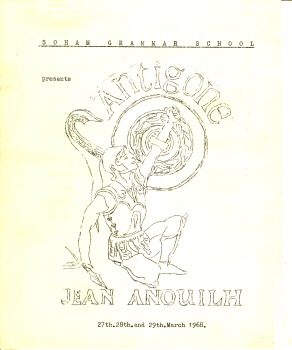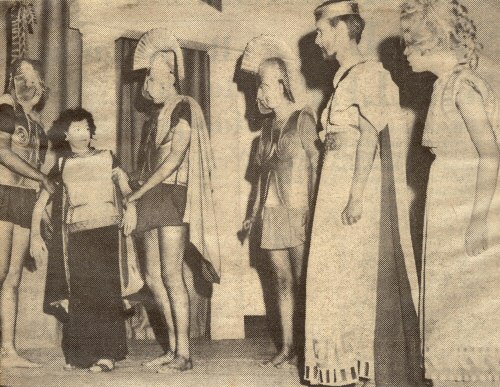SOHAM GRAMMAR SCHOOLpresentsAntigoneJean Anouilh27th, 28th and 29th March 1968 |
|
 |
The action takes place in Thebes and covers the period of one day. There will be one interval of 20 minutes.
Costumes designed by Mr PJ
Askem, made by Parents of the cast
Helmets and armour made by JH Bailey, DM Beale, AP Oakey
Decoration to costumes PJ Padget
Set designed by Mr RGS Bozeat, made by AN Baldrey, TC Ewer,
HD Wilderspin
Stage manager Mr RJ Humphry
Lighting Mr RJH Makin, NV Grainger, RE Gretton, CR Maschke
Prompter JA Saul
Make-up Mrs MF Chapman, Mr PJ Askem
Business manager Mr GH Rees
Apology is made for the modern plaster cast worn by Haemon, but he suffered a broken thumb last week.
All those who helped with the production are thanked most sincerely, especially friends of the school and the parents of the actors for devoting so much imaginative care to the costumes. Besides our sincere thanks, an apology is extended to anyone whose name has been inadvertently omitted from the programme. Without volunteers to take part, no play can be performed. All the cast are warmly thanked for their unflagging enthusiasm and co-operation in the face of illness and other calls on their time.
The myth of Antigone was re-written by Anouilh during the German occupation of France, probably to show how the French should behave, Creon being the acceptors, Antigone the resistance.
It was intended by Anouilh that the play should be acted in modern dress, but for physical, aesthetic reasons, we are presenting the action in Greek costume, designed by Mr Askem and made by the parents of the actors. The exception is the Chorus who is intended to be 'out of time' but is not, we hope, out of place.
Newmarket Journal,
Thursday April 4 1968SOHAM GRAMMAR SCHOOL 'ANTIGONE'This year's production by' Soham Grammar School was "Antigone" by Jean Anouilh, and the beautiful costumes (designed by Mr PJ Askem) and a simple but highly effective set (designed by Mr RGS Bozeat) gave the actors every chance to appear to their best effect. The play is set in motion by the Chorus (played by Richard Brown) who is an "on stage" commentator for the play. His task is to strike the right balance between restraint and dramatic urgency so as to put the play in its right framework. Just how well he succeeded' can be shown by the fact that right from the first lines one felt one was in imminent contact with great tragedy. The cast are to be congratulated on achieving just the right note for their respective roles, Haemon, the king's son and Antigone's lover (Donald McFarlane) was, one felt, truly a young man gnawing on the bone of youth who, when faced with the loss of his Antigone, could find no course but self destruction. His quarrel with his father, who will not save Antigone was full of fire and foreboding. |
 A scene from Soham Grammar School's production, last week of "Antigone", by Jean Anouilh. From left to right are David Bush, Duncan McFarlane, Ian Campbell, Peter Goodfellow, John Brown and Alan Jarman."Journal" photo |
Antigone's sister, Ismene (A Jarman) was exactly the beautiful woman who is too attached to the pleasures of this world to support her sister in her hour of crisis.
LONG SCENES
Noteworthy performances were also given by K Bent
(Messenger) and S Freeman, as the kindly old nurse who is not
quite aware of what is taking place till too late. Guards P
Goodfellow, D Bush and I Campbell, and page-boy S Butcher.
did well.
The secondary roles were well performed, but the play depended on the performance of Antigone herself (Duncan McFarlane) and King Creon (John Brown) - the clash between independent idealism and prudent realism.
It was not until the second half of the play when both came face to face in a long and taxing scene that one realised just how well these two performed. Their lines were most clearly spoken (this was true for the whole cast) and they proved themselves most capable in the art of the use of gesture and look.
This was a play which gave an evening of complete delight and no praise is too high for the production of Mr RH Hanworth, which emphatically reinforced the high reputation of Soham Grammar School dramatic productions.
Antigone - review in the Summer 1968 Soham Grammarian
This year's School Play had the smallest cast of any production the school has staged in recent years and this was bound to make great demands on the cast even if it were not for the fact that any play by Jean Anouilh makes demands on its actors. A third reason why this should be so is that although this play is a modern version of the ancient Greek legend - typified by the Chorus being in evening dress - nevertheless it observes the classical style and action on stage is reduced to the minimum, thus causing an even greater burden being imposed on the actors. This play then was bound to stand or fall by the ability of its actors to get the maximum effect from their lines. A truly challenging task for a young cast, though they were fortunate to have most beautiful costumes designed for them by Mr PJ Askem and a starkly simple set designed by Mr RGS Bozeat which gave the actors every chance to appear to their best effect.
The Play is set in motion by the Chorus (played by Richard Brown). His task is to be our on stage commentator on the play. We were fortunate to see an interpretation which struck just the right balance between restraint and dramatic urgency so as to give the Play its correct framework. He was the ideal commentator who never intruded too far into the action, always speaking his lines most clearly.
If one leaves on one side for a moment the two chief characters, the rest of the cast must also be congratulated on their performances. Haemon, Antigone's lover, played by Donald McFarlane, was one felt, a young man gnawing on the bone of youth, impatient with the world and, when faced with the loss of Antigone, unable to find any other course but self destruction. Antigone's sister, Ismene, played by A Jarman was the shallow superficial person who catches the eye but is unable to support her sister in a crisis until much too late and even then we doubt if her determination would have been strong enough.
Noteworthy performances were also given by K Bent as the Messenger who has one most important long speech late in the play and did full justice to it, and by S Freeman who was the kindly but simple old nurse who is not quite sure what is taking place round about her.
Neither is the Play let down by the three guards (P Goodfellow, D Bush and I Campbell), who were of the earth earthy and also S Butcher's page, was a small gem of innocent youth. The minor and secondary roles then were good but the play stands or falls by the interplay between Antigone (Duncan McFarlane) and King Creon (John Brown).
I, personally, cannot recall having ever seen two actors in a school performance give performances which were so strong and yet so emotional. From the very first moment he set foot on the stage Creon was the king. Yet when he came face to face with Antigone he was to be baffled by her wilful idealism. She who wanted her share of life and happiness NOW and could brook no delay or compromise was in her turn unable to bend Creon, even if she wished to, and the play moved on to its tragic climax and closing lines when Creon is left, alone, to carry on the business of governing. I was truly fascinated and moved by the performance given by these two in their long encounter in the second half of the play when the wheel of tragedy is given the push which sends it spinning inexorably on its way. Not only did both actors speak their lines most clearly and beautifully (this was true of all the cast), but they proved themselves most capable in the art of gesture and look.
One final compliment must be paid. If the cast was a good one, nevertheless it needed a guiding hand and no praise can be too high for the direction of Mr RH Hanworth. He produced a team which knew both what it had to do and also how to do it. All in all an evening of complete delight.
Summer 1968 Soham Grammarian provided by Martin Duffield